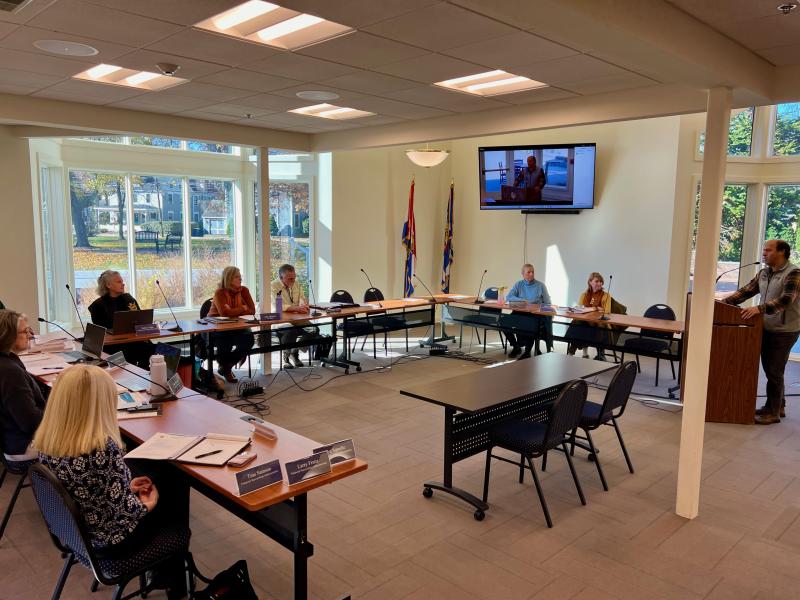Lewes subcommittee explores tax, fee increases

A City of Lewes subcommittee has unveiled an ambitious plan for raising revenue that includes across-the-board tax and fee increases.
The financial stewardship subcommittee presented its recommendations at its Dec. 3 meeting. The subcommittee is co-chaired by councilpersons Amy Marasco and Joe Elder.
The proposal includes a property tax hike that would have the average residential tax bill increase by $160 per year. The increase is projected to bring in an additional $593,000 per year.
The subcommittee is also calling for a $100 per-parcel fee to create a new resiliency fund. That fee would be added on to the tax bill.
A resiliency or rainy day fund would be in place to mitigate issues ahead of storms, provide money to recover from storms, build more resilient buildings and provide cost-share funds for federal grants.
Lewes City Manager Ellen Lorraine McCabe said the fee would initially generate $380,000. She said the city would kick-start the fund with $300,000 from the Chesapeake Utilities franchise fee and $180,000 from the Lewes Board of Public Works in-lieu franchise fee.
Marasco said the goal would be to have hundreds of millions of dollars over time in the fund. She said redirecting city money to seed the fund will allow them to start applying for matching grants.
“We want to build better,” Marasco said. “When we get a significant storm, we want to have funds to help the entire community.”
The subcommittee started work in September to find new revenue streams and make sure the city’s money is earning the best market returns. It is also helping transition the city from an annual budget cycle to a three-year budget and two-year forecast.
“The multi-year budget is the most important. We owe that to the citizens to look ahead and be good stewards of their money,” Marasco said.
Mayor Andrew Williams and Deputy Mayor Khalil Saliba sat in the audience and heard the subcommittee proposal for the first time.
Any tax or fee increases must be approved by mayor and city council. Williams said there are a lot of questions for council to consider.
“Are we simply raising all the fees to generate income without tying that to what we’re going to spend it on? Do we need all of those increases, some of them or none of them? I doubt none of them,” Williams said. “But, even a resiliency fund is still conceptual. Do we fund it at the levels they’re suggesting or is there a halfway point that takes us longer to get there? I think all those things will come into balance.”
Williams said the city has to be sensitive to raising taxes in light of the county reassessment.
“When I first heard the resiliency idea, I thought it was a good idea,” said Lewes resident Ed Zygmonski. “But to have that all at once, say this coming year, and it would be a 32% increase. I question that. Let’s not have a situation where we’re doubling up on residents.”
The subcommittee is also proposing the following increases:
• Building permit fees from $25 to $50
• Fines of up to $500 for code violations
• Hike of 0.5% in the gross rental receipts tax on short-term rentals.
The panel also proposes hikes in boat slip fees at the Canalfront Park marina and city dock.
The plan raises, in some cases more than doubles, permit fees for bonfires, races, weddings and park events. The panel said there might be a discount for Lewes residents.
Marasco said there is no projection for how much additional revenue the entire package of increased taxes and fees would generate.
She said members of the panel are still researching how much would be generated by increasing parking meter rates. A report is expected next spring.
Marasco also said the city is waiting for results of a state study on funding for volunteer fire companies before it possibly recommends a public safety fee.
The panel released its plan after tallying results from its Nov. 21 budget workshop.
The workshop was an exercise that gave residents the opportunity to vote with fake dollars on how the city should spend real money, and how it should acquire that money.
Assistant City Manager Janet Reeves said people voted for infrastructure, parks, city facilities, resiliency, city operations and charitable donations, in that order, as most important.
She said the top three revenue streams residents favored to fund those categories were a resiliency fund fee, increased building permit fees and higher property taxes.
Reeves said 37 people participated in the day session, with 10 more in the night session of the workshop.
The subcommittee also created a nonprofit grant application form and survey for organizations to complete when requesting city donations.
Members of the panel are also working to make sure the city’s current investments are getting the highest returns.
The Dec. 3 meeting was the subcommittee’s last. Its work will now be carried forward by the full finance committee.
See the meeting link at lewes.civicweb.net.
Bill Shull has been covering Lewes for the Cape Gazette since 2023. He comes to the world of print journalism after 40 years in TV news. Bill has worked in his hometown of Philadelphia, as well as Atlanta and Washington, D.C. He came to Lewes in 2014 to help launch WRDE-TV. Bill served as WRDE’s news director for more than eight years, working in Lewes and Milton. He is a 1986 graduate of Penn State University. Bill is an avid aviation and wildlife photographer, and a big Penn State football, Eagles, Phillies and PGA Tour golf fan. Bill, his wife Jill and their rescue cat, Lucky, live in Rehoboth Beach.






















































